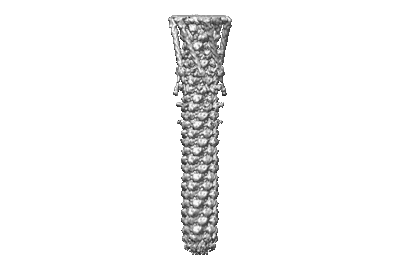EMD-31710
Sheath-tube trunk of Photorhabdus Virulence Cassette (PVC) loaded with PldA
EMD-31710
Single-particle10.8 Å
 Deposition: 12/08/2021
Deposition: 12/08/2021Map released: 17/08/2022
Last modified: 28/02/2024
Sample Organism:
Photorhabdus asymbiotica
Sample: Sheath-tube trunk of Photorhabdus Virulence Cassette (PVC) loaded with PldA
Deposition Authors: Cheng J ,
Shen J
,
Shen J  ,
Xia W,
Li N
,
Xia W,
Li N  ,
Gao N
,
Gao N  ,
Jiang F
,
Jiang F  ,
Jin Q
,
Jin Q 
Sample: Sheath-tube trunk of Photorhabdus Virulence Cassette (PVC) loaded with PldA
Deposition Authors: Cheng J
 ,
Shen J
,
Shen J  ,
Xia W,
Li N
,
Xia W,
Li N  ,
Gao N
,
Gao N  ,
Jiang F
,
Jiang F  ,
Jin Q
,
Jin Q 
N-terminal signal peptides facilitate the engineering of PVC complex as a potent protein delivery system.
Jiang F  ,
Shen J
,
Shen J  ,
Cheng J
,
Cheng J  ,
Wang X,
Yang J
,
Wang X,
Yang J  ,
Li N
,
Li N  ,
Gao N
,
Gao N  ,
Jin Q
,
Jin Q 
(2022) Sci Adv , 8 , eabm2343 - eabm2343
 ,
Shen J
,
Shen J  ,
Cheng J
,
Cheng J  ,
Wang X,
Yang J
,
Wang X,
Yang J  ,
Li N
,
Li N  ,
Gao N
,
Gao N  ,
Jin Q
,
Jin Q 
(2022) Sci Adv , 8 , eabm2343 - eabm2343
Abstract:
Extracellular contractile injection systems (eCISs) are widespread bacterial nanomachines that resemble T4 phage tail. As a typical eCIS, Photorhabdus virulence cassette (PVC) was proposed to inject toxins into eukaryotic cells by puncturing the cell membrane from outside. This makes it an ideal tool for protein delivery in biomedical research. However, how to manipulate this nanocomplex as a molecular syringe is still undetermined. Here, we identify that one group of N-terminal signal peptide (SP) sequences are crucial for the effector loading into the inner tube of PVC complex. By application of genetic operation, cryo-electron microscopy, in vitro translocation assays, and animal experiments, we show that, under the guidance of the SP, numerous prokaryotic and eukaryotic proteins can be loaded into PVC to exert their functions across cell membranes. We therefore might customize PVC as a potent protein delivery nanosyringe for biotherapy by selecting cargo proteins in a broad spectrum, regardless of their species, sizes, and charges.
Extracellular contractile injection systems (eCISs) are widespread bacterial nanomachines that resemble T4 phage tail. As a typical eCIS, Photorhabdus virulence cassette (PVC) was proposed to inject toxins into eukaryotic cells by puncturing the cell membrane from outside. This makes it an ideal tool for protein delivery in biomedical research. However, how to manipulate this nanocomplex as a molecular syringe is still undetermined. Here, we identify that one group of N-terminal signal peptide (SP) sequences are crucial for the effector loading into the inner tube of PVC complex. By application of genetic operation, cryo-electron microscopy, in vitro translocation assays, and animal experiments, we show that, under the guidance of the SP, numerous prokaryotic and eukaryotic proteins can be loaded into PVC to exert their functions across cell membranes. We therefore might customize PVC as a potent protein delivery nanosyringe for biotherapy by selecting cargo proteins in a broad spectrum, regardless of their species, sizes, and charges.
